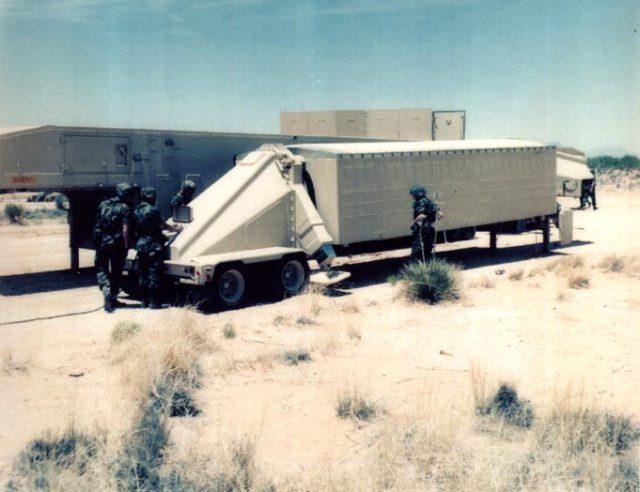
International relations sometimes turn on points of deep uncertainty. One of the hottest current debates concerns the capabilities of the AN/TPY-2 radar associated with the THAAD system being deployed in South Korea. The question of how far the radar can see into China ranks up there with great mysteries, such as the fate of the crew of the Mary Celeste and the air-speed of an unladen swallow. The headline of a Reuters column captured the dilemma neatly: ‘China wary about US missile system because capabilities unknown’.
Estimates of the radar’s range vary widely—blurred in part by the fact that it can be used in two modes. In its forward-based mode, the radar is deployed in reasonable proximity to the probable launch point. It detects and tracks all classes of missiles in their launch/boost phase, and subsequently hands off its data to the wider Ballistic Missile Defence System. In its terminal mode, itmonitors incoming missiles and warheads to enable interception by its THAAD battery.
Many of the arguments about the radar in South Korea assume it’ll be used in its forward-based mode. Chinese commentators, in particular, are concerned about its ability to degrade the effectiveness of China’s strategic missile arsenal, either by providing more granular data on Chinese missile testing, or by contributing early trajectory data to the broader US Ballistic Missile Defense System. But in South Korea, the principal mission will be to guide terminal interceptions by THAAD. It’s primarily going to be used in the terminal mode. True, the hardware’s the same for both modes and swapping the software seems to take only a matter of hours.
Still, with the radar configured to its forward-based mode, the THAAD interceptors in South Korea would be largely useless. An AN/TPY-2 operating in forward-based mode can support cueing for another AN/TPY-2 operating in terminal mode, but it can’t replace it.
With that caveat, let’s have a closer look at range estimates. Back in September 2012, US scientists George Lewis and Theodore Postol calculated the radar’s range as 870 km for simple detection, and 580 km for discrimination. Lewis and Postol spell out in detail the assumptions upon which their calculation is based. One of those assumptions, for example, is that the target is ‘a conical warhead with a radar cross-section at X-band of 0.01m2.’
The Lewis and Postol estimate coincides broadly with the figure used later by Jaganath Sankaran and Bryan Fearey, who argue that ‘a THAAD radar would have a maximum range of approximately 800 kilometers under even highly optimistic conditions’. Sankaran and Fearey use that estimate to point out that the radar would have almost no capability to detect and track Chinese ICBMs.
In July 2016, a commentator on a missile defence blog separated out a range of different estimates—from about 480 km to 3,000 km—and explored the reasoning behind them. The range is shortest when the radar is in terminal guidance mode, and at its (uncertain) longest when in the forward-based mode. That makes sense. The range of the THAAD interceptor is about 200 km. There’s little point in having a radar with an excessively long range if its primary function is to guide interceptors to targets in the demanding terminal phase.
So let’s assume 800 km is approximately right for the radar in its forward-based mode. Yes, the range would be longer if the target were bigger—if the radar were looking at a warhead from side-on, for example, rather than front-on. And, yes, the radar will get better over time. It’s currently being upgraded from gallium-arsenide to gallium-nitride components: the benefits, apparently, include enhanced range, and increased detection and discrimination performance. The software’s getting better too.
But I think the Reuters headline is wrong on one important point: Chinese analysts are concerned about the radar not simply on the basis of what they don’t know, but on the basis of what they do. They only have to look at the record of testing by the US Missile Defense Agency (MDA) to know that the AN/TPY-2 radar, operating in its forward-based mode, is frequently a featured sensor, even in relation to intercepts of longer-range missiles. See, for example, this brief video of FTG-05, a test conducted in December 2008. The AN/TPY-2, deployed in Juneau, Alaska, acted as the forward radar in relation to the tracking and interception of a missile launched from Kodiak, Alaska.
Then there are tests for which little unclassified data is available. In relation to the ‘Fast Aim’ test in August 2013, for example, the US Director of Operational Testing and Evaluation wrote only: ‘In Fast Aim, the MDA demonstrated a capability of the AN/TPY-2 (FBM) radar to support a potential new BMD capability against ICBM threats’. Teasing, don’t you think?
So China does have a case that AN/TPY-2s in the forward-based mode can support the interception of ICBMs. The flaw in that case doesn’t really rest on the capabilities of the AN/TPY-2 radar, nor even on the fact that the South Korean radar will likely operate principally in terminal mode. It rests on China’s assumption that it’s entitled to a guaranteed second-strike nuclear capability. No such guarantee exists in international security. Yes, Mutual Assured Destruction was—and is—a key feature of the US-Russian nuclear relationship. But MAD evolved from technological facts; the facts did not evolve from it. Here, the facts are pulling in a different direction. It’s up to China—not the US—to ensure it has a second-strike capability.